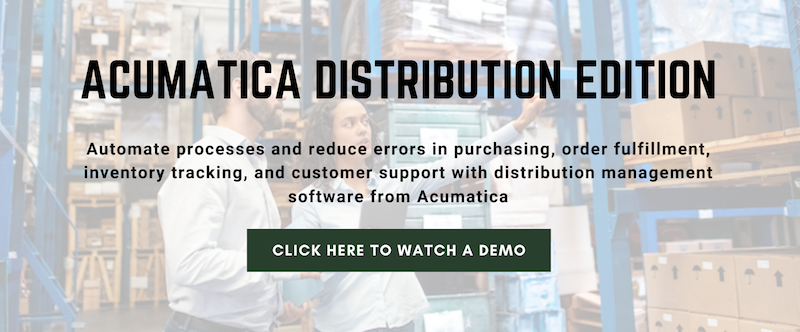Finding the ideal ERP software for your distribution business can feel like feeling your way through a maze. Perhaps you’ve outgrown your once functional, but now less productive accounting software. Even after having adding extra software modules to make up for what their original software didn’t offer, you see it’s time to get a dedicated Enterprise Resource Planning (ERP) solution designed just for distributors like you. How should you proceed? This article offers some guidance based on our understanding of how distributors have chosen the best ERP software for their businesses.
What Kind of Distribution Business are You Running?
One of the first steps in determining the right distribution ERP choice is to understand how your type of distribution business aligns with your software options. Distribution products are usually categorized as either durable, long-lasting “hard” goods or non-durable “soft” goods with a short lifespan. Durable goods include cars, electronics and building supplies, while soft goods encompass items like food and beverages, paper goods, clothing and beauty products. Their respective product characteristics will determine how they will be sorted, managed and distributed.
Some ERPs are better at supporting soft goods. Others are good for hard goods. Others still support both. Acumatica, for example, enables effective management of durable and non-durable goods alike with unique features such as lot and serial control, matrix items, first-expired-first-out sorting by expiration date and kitting and disassembly.
Going further into this issue, are you a general distributor or a wholesaler? That distinction will affect your ERP requirements. General distributors are the “middlemen” businesses who operate between a product manufacturer and the other entities in a distribution supply chain. A general distributor normally buys small quantities of product and sells to retailers or perhaps other manufacturers. To support general distributors, ERP cloud software like Acumatica manages B2B commerce, barcoding and light warehouse management (WMS), essential Customer Relationship Management (CRM), marketing, sales and kitting.
Wholesale distributors, in contrast, purchase huge quantities of product from a manufacturer and sell by volume at lower prices. Wholesalers may also sell directly to the consumer end-user. Many wholesale distributors partner with manufacturers, retailers and smaller distributors, which provide drop-ship services, fulfillment and storage. ERP requirements for wholesale includes service management, B2B and B2C commerce, blanket purchase orders, warehouse transfers and more advanced WMS features.
How Important is Your Warehouse?
Wholesalers tend to look hard at Warehouse Management features when they consider their ERP options. After all, warehouse operations are where operating expenses and productivity issues can affect profitability. Modern cloud ERP for WMS replaces legacy software. It offers the ability to track and control pieces of a business from handheld devices—including processing and confirmation of multiple shipments going to multiple locations at the time of pick, change orders, damage control and immediate customer returns data.
Where Do You Want to Go?
The disruptive changes from Amazon and other big players are affecting the distribution business. Consumer expectations for low prices, endless product availability and low-cost delivery are tightening margins across the industry. Distributors who utilize cloud ERP gain the ability to respond by seizing control over every aspect of their products and optimizing operational processes. Cloud ERP for distribution also provides real-time information accessible to employees and customers.
Thinking about Risk
Security is a significant factor driving selection of ERP solutions for distributors. Business disruptions due to ransomware or liabilities and brand damage from data breaches can be ruinous for a distributor. As a result, the chosen ERP software must come with robust countermeasures. For example, secure import and export utilities are crucial in defending your digital core from malicious external threats. Applications developed for the cloud, along with customization and integration options, protect what is yours and helps you keep an eye on the entire process. This is more critical than ever, especially with the increased mobility of end users.
Figuring out ERP for a distribution business can be a challenging process. We can help. We have worked with many distribution companies in the selection of a suitable ERP solution and then partnering with them for a successful implementation. To learn more, watch our Acumatica distribution demo or contact us for what promises to be a productive dialogue about the potential for software in your distribution company.
Get the Full Handbook: A Guide to Selecting the Right ERP Software for Your Industry
This handbook guides wholesale distributors through the evolving world of ERP applications, including functional requirements based on the types of products they distribute. Readers will discover differences between general ERP and industry applications, standard features available in midmarket ERP systems, and industry-specific requirements. Download the Distribution ERP Handbook now.
Additional Distribution Resources
How Distributors Can Simplify Item Management with Acumatica
5 Tips to Streamline Your Supply Chain
5 Benefits of Inventory Management in the Cloud


